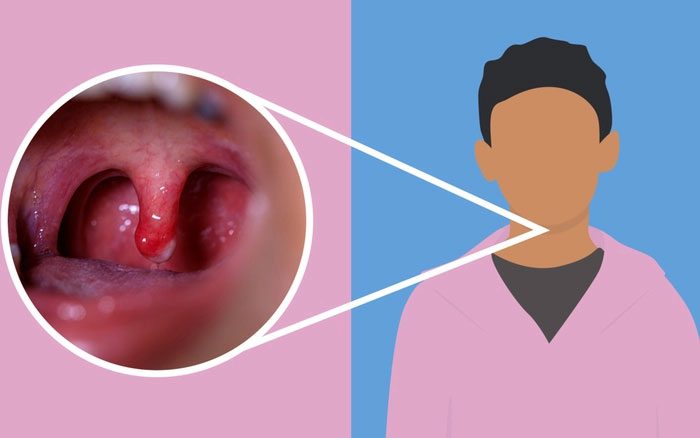Swollen Uvula (in Vietnamese: Sưng lưỡi gà) can cause discomfort due to swelling and pain, making it difficult to eat, drink, and even breathe.
Swollen Uvula: Causes, Symptoms, and Treatment
The uvula is a small piece of tissue that hangs at the back of the throat, located between the tonsils. The **uvula** plays a crucial role in **closing off the nasopharynx** during the swallowing of food and liquids, as well as during speech. It helps prevent food and drink from entering the nasal cavity, which can cause choking.
In addition to this function, the uvula also assists in forming certain sounds during speech, produces saliva to lubricate the back of the mouth while swallowing, and prevents the soft palate from being pressed down during coughing or sneezing.
1. Symptoms of a Swollen Uvula
A swollen uvula may lead to several common symptoms, including:
- A choking sensation in the throat
- Difficulty breathing
- Difficulty swallowing
- Sore throat
- Changes in voice
- Snoring during sleep
- Visible red spots on the uvula
- Swollen tonsils
- Increased saliva production.
2. What Causes a Swollen Uvula?
A swollen uvula can result from infections, allergic reactions, trauma, or certain hereditary conditions.
2.1. Infections
Infections occur when bacteria or viruses invade the body, particularly infections or inflammation in the throat that can cause swelling in the uvula and surrounding tissues. These may include:
- Streptococcal Pharyngitis: Group A Streptococcus is often the cause of a severe sore throat. Streptococcal throat infections typically present more severe symptoms than those caused by other viruses or bacteria. In addition to a sore throat, streptococcal infections may also cause swollen lymph nodes in the neck, difficulty swallowing, nausea, and loss of appetite.
- Mononucleosis: This condition can lead to disorders such as tonsillitis and uvula swelling. Common symptoms include fatigue, sore throat, headache, swollen lymph nodes, swollen tonsils, a white or yellow coating on the tonsils, fever, loss of appetite, rash, muscle aches, splenomegaly, and throat inflammation.
- Influenza: The uvula may swell as part of the symptoms in the throat when infected with the flu. Other flu symptoms include chills, sweating, dry cough, nasal congestion or runny nose, headache, fatigue, vomiting, and diarrhea.
- Tonsillitis: Severe tonsil infections may cause significant swelling of the uvula. This does not necessarily indicate that the infection has spread. Treating the tonsils will also help relieve swelling in the uvula.

Swollen tonsils can also lead to uvula swelling. (Image: Internet).
- COVID-19: Rarely observed
- Epiglottitis: This form of infection leads to swelling of the epiglottis and surrounding structures. Epiglottitis can quickly result in sudden respiratory issues and even death. Symptoms include severe sore throat, difficulty swallowing, high fever, drooling, and wheezing when inhaling.
Diagnosis typically involves imaging the structures in the larynx rather than throat swabs (which can lead to breathing cessation), and this is not performed until adequate respiratory support is available. Throat examination will be conducted in the operating room.
2.2. Other Causes of Uvula Swelling
- Allergic Reactions: A swollen uvula can occur due to allergic reactions leading to swelling (angioedema) in the mouth and throat or isolated uvula swelling known as uvular angioedema. This may indicate anaphylaxis and requires urgent medical care.
- Stomach Acid: Refluxing into the esophagus or throat during vomiting or chronic acid reflux can irritate the throat and uvula, leading to swelling, voice changes, and a sensation of a lump in the throat.
- Dry Mouth: The cells lining the mouth, throat, and uvula function best in a moist environment. However, chronic dry mouth, regardless of fluid intake (e.g., due to nasal congestion or side effects from certain medications), can lead to uvular inflammation, resulting in redness, pain, and swelling.
- Tongue Injury: The uvula can be injured by hot food, although this is quite rare. Minor surgeries such as intubation or tonsillectomy can also lead to uvular injury. While the injury will heal without treatment, it may still cause discomfort. You can soothe a swollen uvula with ice chips or oral sprays containing local anesthetics.
- Snoring: Snoring and swollen uvula can create a vicious cycle. The larger the swollen uvula, the more likely you are to snore, and the more you snore, the larger the uvula may become. If this condition causes problems with your ears, nose, throat, sleep, or other health issues, consult your doctor.
- Alcohol and Tobacco Use: Both can irritate the throat lining and uvula, leading to redness and irritation. The issue can worsen if you smoke and drink alcohol simultaneously.
- Medication Side Effects: Certain medications can cause dry mouth, leading to a swollen uvula. Medications such as antidepressants, asthma medications, ACE inhibitors, and bladder overactivity treatments may have this side effect. Speak with your doctor about alternatives or dosage adjustments. Patients should not stop taking medications without their doctor’s guidance.
- Oral and Pharyngeal Cancer: Throat cancer can sometimes begin with the uvula, although this is rare. Benign tumors, such as those related to HPV, can affect the uvula and tend to grow slowly over time. Malignant lesions can also develop, especially in smokers, and tend to grow more quickly, leading to ulcers, bleeding, or pain.
3. When to See a Doctor for a Swollen Uvula?
The treatment for a swollen uvula depends on the underlying cause, which may involve over-the-counter medications or prescription medications like antibiotics, or even surgery to remove the uvula. Some home remedies may help treat mild uvula swelling, such as:
- Drink plenty of water if the swelling is due to dry mouth or dehydration
- Gargle with warm salt water to soothe the throat
- Try throat lozenges containing eucalyptus or throat sprays to numb the pain
- Make hot tea with honey or honey mixed with warm water to soothe the throat
- Suck on ice chips to reduce uvula swelling
- Get plenty of rest and avoid irritants such as tobacco and alcohol.
If you have applied home remedies and the uvula continues to swell significantly without improvement, you should see a doctor. In the case of an allergic reaction, seek emergency medical care.
If you experience any of the following symptoms, you should see a doctor as soon as possible: severe difficulty swallowing, dehydration, difficulty breathing, blood or pus drainage from the uvula, uncontrolled pain that continues to worsen, fever and abdominal pain, loss of voice, or hoarseness.





















































